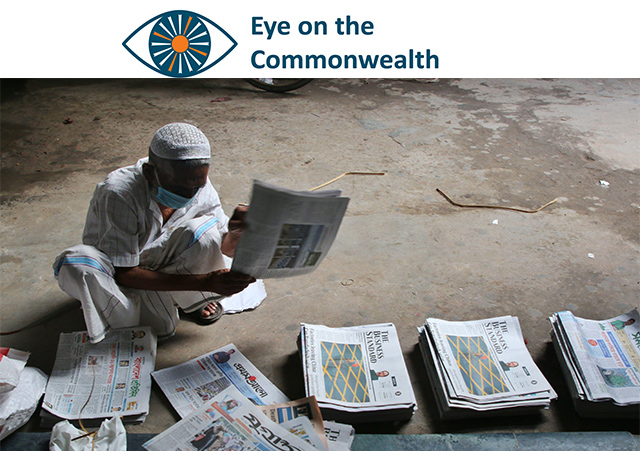 Newspaper hawker in Bangladesh. [Photo by Sultan Mahmud Mukut / SOPA Images/Sipa USA/ Alamy stock]
Newspaper hawker in Bangladesh. [Photo by Sultan Mahmud Mukut / SOPA Images/Sipa USA/ Alamy stock]
With two-thirds of the world’s population estimated to have a smartphone, the 30th anniversary of World Press Freedom Day on 3 May should be a moment to marvel at how so many people across the globe can enjoy such easy access to informed, accurate news. Yet we also have never been so bombarded by disinformation and misinformation – and the truth has never been so easily dissembled and distorted.
This week also saw publication of Reporters Without Borders’ (RSF) press freedom index, which like the day itself has its origins in the 1991 Windhoek Declaration, when, as Namibia emerged from its long liberation war to become an independent nation, journalists from across Africa asserted the need for an equally independent media.
Commonwealth Global Challenges: Session three – Upholding human rights, press freedom and democracy: Can the Commonwealth make a difference?
RSF pays tribute to how the country has maintained a vibrant and free media: ‘Freedom of the press is firmly anchored in Namibia, historically one of Africa’s best-ranked countries.’ At 22nd in the world index, Namibia is once again the highest-ranked country in Africa. No media workers were killed or locked up there in the last year; globally, however, 568 journalists or media workers are being detained and seven were killed in the line of work so far this year. In contrast to Namibia, RSF classifies the situation for journalism overall as ‘bad’ in nearly 40% of African countries, compared with 33% last year.
‘Very bad’ for journalists
Among fellow Commonwealth member states, south Asia is at the other end of the scale from Namibia, with all three countries on the Indian subcontinent among the 31 lowest ranked – classified as ‘very bad’ for journalists. Bangladesh gets the wooden spoon (as it did last year), coming 163rd out of 180; India is close behind in 161st place; Pakistan is 150th.
Nearly a quarter of the 42 countries in the next lowest category, termed ‘difficult’, are Commonwealth members: Eswatini (formerly Swaziland), in 111st place (up 20 places), Kenya (plummeting from 69 to 116), with Nigeria at 123, then Singapore, Rwanda, Uganda, Sri Lanka, Cameroon, through to Brunei at 142. Tanzania has strangely fallen 20 places to 143rd, despite its president, Samia Suluhu Hassan, being far more tolerant of a critical media than her erratic predecessor, John Magufuli.
No Commonwealth country is among just eight countries RSF considers to be ‘good’ for press freedom. The highest-ranking Commonwealth member is New Zealand in 13th place (down from 11th), followed by Canada in 15th (four places higher). RSF calls 19th-placed Samoa (up from 45th in 2022), a ‘model of regional press freedom’, along with New Zealand and South Africa (up 10 at 25). The UK has slipped two places to 26th, while Australia is 27th (up from 39 after the change of government but with the warning that ‘ultra-concentration of media ownership, combined with growing official pressure, endanger public-interest journalism’).
Self-censorship
Media tycoons’ power is also highlighted in India, which continues its steady fall in recent years by sliding another 11 places, not helped by the government’s recent swipe at the BBC, supposedly over tax infringements. ‘Media takeovers by oligarchs close to prime minister [Narendra] Modi have jeopardised pluralism,’ RSF notes, adding: ‘At the same time, Modi has an army of supporters who track down all online reporting regarded as critical of the government and wage horrific harassment campaigns against the sources. Caught between these two forms of extreme pressure, many journalists are, in practice, forced to censor themselves.’
RSF suggests Bangladesh is in a similar situation, with one of the world’s most draconian media laws in the Digital Security Act and a prime minister, Sheikh Hasina, apparently intolerant of even routine reporting. The Guardian said Bangladesh’s media were fearful and censoring themselves after Hasina called the leading newspaper Prothom Alo an ‘enemy of the people’ and one of its reporters was detained over an innocuous story on the rising cost of living. ‘Supporters of [Hasina’s] party, the Awami League, often subject the journalists they dislike to targeted physical violence, while judicial harassment campaigns are carried out to silence certain journalists or force media outlets to close,’ the RSF said. ‘In such a hostile environment, editors take care not to challenge anything the government says.’
Media freedom and the Commonwealth
Fighting for press freedom: A battle never done
Meanwhile, the UK’s once-thriving regional press is fighting for its survival in a digital world, with one reporter calling the precarious newspaper industry a ‘Hunger Games for journalists’.
‘Increased aggressiveness’
Christophe Deloire, RSF secretary-general, said the volatility seen in countries jumping up and down the index was the result of ‘increased aggressiveness on the part of the authorities in many countries and growing animosity towards journalists on social media and in the physical world’. He also blamed the growth of the ‘fake content industry’. Noting the rise of artificial intelligence and how it provided an ‘unprecedented ability to tamper with content’ (such as the recent AI-generated photos of Donald Trump being arrested by police), RSF said: ‘The difference is being blurred between true and false, real and artificial, facts and artifices, jeopardising the right to information.’
‘Eye on the Commonwealth’ columns look at current issues facing the Commonwealth
Few of us have yet grasped how radically AI will transform our lives. It promises to take the jobs of many journalists and stoke dangerous controversies. As with advances in healthcare, the ethical debate about how to deal properly with these changes is lagging far behind the technological breakthroughs. One great challenge for the media industry, regulators and consumers of news over the next decade will be teaching our children and ourselves in how to distinguish between fake news and the truth.
Oren Gruenbaum is a member of the Round Table editorial board



